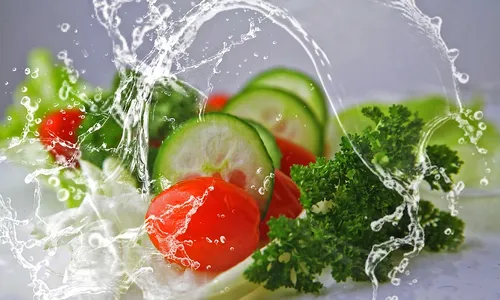7 Fermented Foods That Heal Your Gut Naturally

Picture this: you're at a friend's dinner party, enjoying a delicious spread when suddenly — boom — your stomach decides to start a drum solo. Bloating, gurgling, and that "uh-oh" moment we've all felt after one too many slices of cheese pizza. Sound familiar? You're not alone. Gut issues are the uninvited guests we all keep feeding — literally. But what if your next snack could be your gut's superhero? Enter: fermented foods.
Fermented foods are the probiotics-packed, bacteria-rich, gut-healing wonders your digestive system has been craving (and possibly texting you about in secret). In this article, we're diving into 7 fermented foods that are not only tasty but naturally heal your gut — no expensive supplements or questionable detox teas required.
1. Yogurt: The Classic Probiotic Powerhouse
Let’s start with the obvious one — yogurt. It’s basically the Beyoncé of fermented foods. This creamy delight is teeming with live cultures, mainly Lactobacillus and Bifidobacterium, which help populate your gut with beneficial bacteria. The result? Better digestion, improved immunity, and fewer "uh-oh" moments after meals.
Opt for plain, unsweetened yogurt with "live and active cultures" on the label. Flavored versions often sneak in sugar that feeds the bad bacteria instead of the good guys. Pro tip: if your yogurt tastes like dessert, it’s probably not doing your gut any favors.
2. Sauerkraut: Not Just a Hot Dog Sidekick
Sauerkraut might remind you of ballpark franks, but this tangy cabbage ferment is a gut health superstar. Made by lacto-fermentation, sauerkraut is rich in fiber, vitamins C and K, and billions of probiotics. It helps maintain the balance of good bacteria, aids in nutrient absorption, and boosts overall digestion.
Make sure you're getting the real stuff — raw and unpasteurized sauerkraut found in the refrigerated section. The shelf-stable cans? Not so much. Those are usually heat-treated, which zaps the probiotics right out of them.
3. Kimchi: Korea’s Spicy Gift to Your Gut
Kimchi is like sauerkraut’s cooler, spicier cousin from South Korea. It’s a fiery mix of fermented cabbage, radish, garlic, ginger, and chili flakes. And yes, it’s got attitude — and an army of good bacteria. Kimchi is known to improve digestion, reduce inflammation, and even support brain health through the gut-brain axis.
What’s more, it contains compounds called isothiocyanates, which may help fight cancer cells. All that and it still pairs perfectly with fried rice? Kimchi deserves a cape.
4. Kombucha: The Fizzy Friend with Benefits
If soda and tea had a health-conscious baby, it would be kombucha. This fizzy, slightly sour drink is made by fermenting sweetened tea with a symbiotic culture of bacteria and yeast (a.k.a. SCOBY). It’s trendy, yes, but also teeming with probiotics, enzymes, and B vitamins.
Drinking kombucha can help improve digestion, support liver detoxification, and even give you a little energy boost. Just be mindful of the sugar content — some store-bought versions are more sugar bomb than health tonic. Bonus points if you brew your own. Double bonus points if you don’t name your SCOBY something weird (but let’s be honest, you will).
5. Kefir: Yogurt’s Drinkable Cousin
Kefir is like yogurt that took a yoga class — it's smoother, more flexible, and slightly tangy. This fermented milk drink is made with kefir grains (not actual grains, but clusters of bacteria and yeast) and packs up to 30 strains of probiotics — way more than most yogurts.
It’s lactose-friendly too, since the fermentation process breaks down most of the lactose. So if you’ve been giving dairy the side-eye, kefir might be your peace offering. Drink it straight, pour it over granola, or sneak it into smoothies. Your gut won’t know what hit it — in the best way possible.
6. Miso: The Umami Elixir of Japan
Miso is the salty, savory paste that gives miso soup its signature flavor. Made by fermenting soybeans with koji (a special mold), miso is rich in probiotics and enzymes that aid digestion and nutrient absorption. It’s also a source of antioxidants, minerals, and B vitamins.
Beyond soup, miso adds depth to salad dressings, marinades, and even mashed potatoes (trust us on this). Just don’t boil miso — high heat kills the good bacteria. Stir it into warm dishes just before serving to keep those probiotic soldiers alive and kicking.
7. Tempeh: The Protein-Packed Gut Booster
Meet tempeh — tofu’s lesser-known but more fermented cousin. Originating from Indonesia, tempeh is made by fermenting cooked soybeans into a firm, cake-like block. It’s rich in protein, fiber, and gut-friendly probiotics.
What makes tempeh stand out is that it’s a whole food, which means you’re getting all the fiber and nutrients from the soybeans along with the fermentation benefits. It’s also versatile — slice it, dice it, marinate it, grill it. It plays nice with your gut and your taste buds.
Why Your Gut Will Thank You
Here’s the thing: your gut isn’t just about digestion. It’s your second brain, housing over 70% of your immune system and influencing everything from mood to metabolism. When your gut microbiome is happy, you feel better, think clearer, and yes — even poop better.
Fermented foods are one of the easiest, tastiest ways to nourish that inner ecosystem. They repopulate your gut with good bacteria, crowd out the bad guys, and help your entire digestive system run smoother than a jazz sax solo.
How to Add Fermented Foods to Your Diet (Without Turning Into a Health Nut)
- Start slow. If you’re new to fermented foods, introduce them one at a time to avoid digestive overload.
- Mix and match. Try a spoonful of kimchi with dinner, a kombucha at lunch, or kefir in your morning smoothie.
- Make it fun. Explore different cuisines — Korean, Japanese, German — that incorporate these naturally.
- Read labels. Look for “live cultures,” “unpasteurized,” and low added sugar.
- Get DIY. Fermenting at home is easier than you think and oddly satisfying (plus you get to say things like “I fed my SCOBY today”).
Bottom Line
If your gut could swipe right, it would definitely be on fermented foods. They’re flavorful, functional, and frankly fabulous. From sauerkraut’s tangy crunch to kefir’s creamy zing, these seven gut-healing foods are easy to add to your routine and can dramatically improve your digestive health, immunity, and energy levels. So the next time your belly throws a tantrum, skip the antacids — and reach for something fermented instead.
FAQ
Are fermented foods safe to eat every day?
Yes, in most cases. For healthy individuals, eating small servings of fermented foods daily can be beneficial. Just listen to your body and start slowly to let your gut adjust.
Can I make fermented foods at home?
Absolutely! Many fermented foods like yogurt, sauerkraut, and kombucha are surprisingly easy to make at home with minimal ingredients and a little patience.
Do fermented foods help with IBS?
They can. Fermented foods may help restore gut flora and reduce symptoms for some IBS sufferers. However, everyone’s gut is different, so it’s best to consult with a healthcare professional if you have a condition like IBS.
What’s the best fermented food for beginners?
Plain yogurt or kefir are great starting points — they’re easy to find, mild in flavor, and generally well-tolerated.
Can kids eat fermented foods?
Yes! In moderation and age-appropriate portions, fermented foods can benefit kids’ digestion and immunity too. Just avoid the spicy or strongly flavored ones at first.
Explore more blogs on health:




